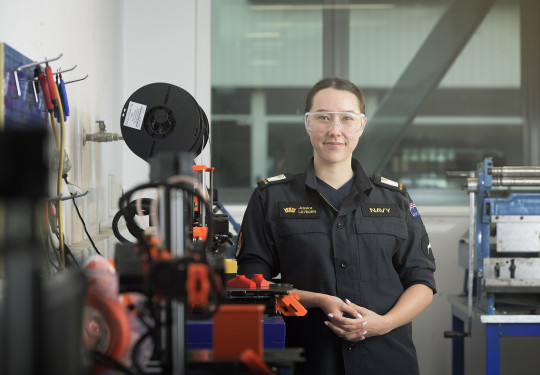Wellingtonian engineers a path with the Royal New Zealand Navy
Midshipman Jess Layburn, 21, from Johnsonville, knew from a young age she wanted to study engineering but she never thought the Royal New Zealand Navy would help to realise her ambition.
03 July, 2023
It was actually aviation that first showed Midshipman Layburn how the military values Science, Technology, Engineering and Maths (STEM). In 2019 she took part in School to Skies, a Royal New Zealand Air Force STEM initiative designed to increase the number of women in the aviation industry. Every year, 30-40 Year 13 students from around Aotearoa New Zealand get a chance to spread their wings and spend six days with the New Zealand Defence Force (NZDF) to find out if a career in the military is right for them.
Her decision to attend proved to be a turning point.
“I was so impressed by all the different roles that were available in the NZDF. No one in my immediate family had served in the military, so growing up I never considered it to be an option,” she said.
“The instructors were so passionate about what they were doing. They took us around the hangar and we got to fly in a Hercules, which was incredible. The week gave a really good insight into what it would be like to work for the military.”
After arriving home from the camp, she visited the NZDF careers website to check the application process, and discovered that NZDF awards tertiary scholarships.
“I wasn’t fully set on the military lifestyle yet, but I knew I wanted to pursue an engineering degree at the University of Canterbury, and figured it couldn’t hurt to apply to the Chatham Scheme scholarship that the Navy offers,” she said.
The Chatham Scheme is a bursary engineering scheme offered by the Royal New Zealand Navy. Recipients join the Royal New Zealand Naval Reserves and complete a six-month induction course in the summer prior to embarking on study towards a Bachelor of Engineering. Students receive an annual $9000 stipend, full-time paid work in the university holidays, and tertiary fees are reimbursed at the end of each successful year of study. Upon graduation, recipients of the scheme transition to full-time service in the Navy as a Marine Engineer Officer or a Weapons Engineer Officer.
Midshipman Layburn said it was really only during the final Officer Selection Board that she became dead set on joining the NZDF.
“It was three days of interviews and evolutions and fitness testing, but even just in those three days I learnt so much about myself, about leadership and heard so many stories from naval personnel about their work and lifestyle,” she said.
Midshipman Layburn’s application was successful and her next step after the selection board was officer training.
“I was only required to do the first three weeks of officer training before heading back to Christchurch to continue working towards my degree in mechanical engineering,” she said.
“In such a short time, I learnt so many valuable skills and met a ton of amazing, motivated and interesting people.”
Alongside university study, Midshipman Layburn attended weekly parade nights at reserve forces unit HMNZS Pegasus. She had also learnt military skills including shooting, drills and sailing and taken part in Anzac Day services which she said is a really special part of being in the Navy reserves.
Now in her final year of study, Midshipman Layburn is looking forward to utilising her skills as a mechanical engineer and embarking on her career as a marine engineering officer with the Navy. She will return to Auckland to complete the Junior Officer Common Training in January 2024.
“It has been such a privilege to be able to study under the Navy Chatham Scheme and I’m so excited for what the future holds after graduation,” she said.
